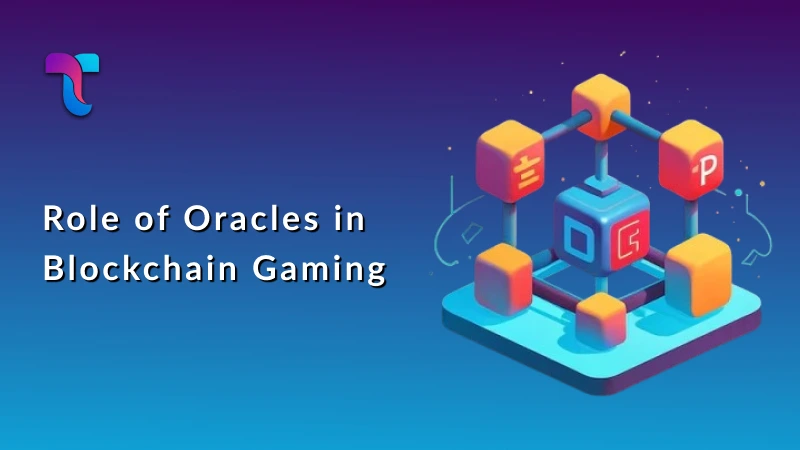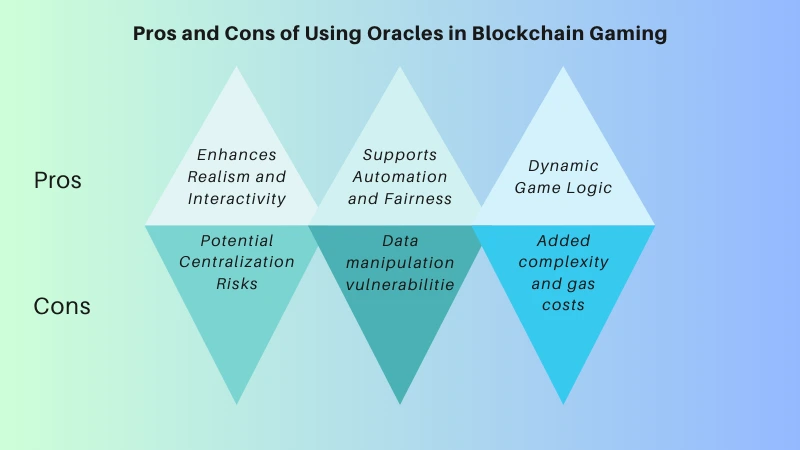Table of Contents
With the rise of blockchain gaming, people are finding new ways of playing, along with earning potential through play-to-earn gaming, enhancing the gaming experience significantly. However, the technology that makes it possible is not just blockchain.
Oracles are the technology that bridges the gap between real-world outcomes and blockchain-based smart contracts. Smart contracts can’t fetch data on their own, so without them, the prediction and any real-world outcomes wouldn’t exist.
According to the Growth Markets Report, the global blockchain market is expected to reach a valuation of USD 11.16 billion by 2033. This projected growth signifies why it is so essential for anyone in the blockchain gaming field to know about oracles.
In this blog, we are going to explore everything about blockchain oracles and why they are important in blockchain gaming.
What is a Blockchain Oracle?
At their core, blockchain oracles are third-party sources of information that provide external data to the smart contracts on the blockchain. We can say that they are third-party sources that feed off-chain data to on-chain environments. They allow smart contracts to interact with the external world.
Since the blockchain is closed, there is no native way for it to fetch real-world events, like weather updates, sports scores, or financial data. Oracles resolve this limitation by serving as the information pipelines, allowing smart contracts to execute their functions accurately and autonomously.
Oracles add tremendous value to blockchain applications by providing accurate, trustworthy, timely, and secure data to decentralized systems.
Why Do Oracles Matter in Blockchain Gaming?
Oracles are very important for blockchain gaming because they connect the real world to the blockchain networks and help them work better. Oracles make blockchain games more fun, reliable, and connected to the digital and physical worlds as a whole.
Here’s a quick rundown of why oracles are essential in blockchain gaming:
Enabling Dynamic In-Game Events Based On Real-World Data
Oracles act as data pipelines, allowing games to trigger events or even change the gameplay based on the events that are happening outside the blockchain in the real world. This creates an even more immersive experience that is lifelike.
Supporting Randomness
Oracles like ChainLink provide verifiable and random results that are important for fair and engaging gameplay mechanics like loot box opening, betting games, or random game outcomes. Devlopers can generate randomness in a decentralized and tamper-proof manner by using oracles.
Facilitating Cross-Platform Assets Use and Verification
Oracles can verify the existence and properties of in-game assets across different blockchains, enabling interoperability. They also ensure that the assets are authentic and that their use is valid, even when moving between different blockchain ecosystems.
Integrating With Off-Chain Economies and Marketplaces
Oracles bridge the deterministic environment of a blockchain with the vast, open data of the real world and other external systems. This integration allows blockchains to interact with external marketplaces, allowing gamers to buy, sell, or use their in-game assets for real-world value and vice versa.
Use Cases of Oracles in Blockchain Gaming
Now, let us take a look at a few of the important use cases of oracles in blockchain gaming.
Real-world weather or sports data impacting game environments
Oracles feed the external data to the games’ smart contracts; these include weather conditions or sports scores. This allows for a dynamic gaming environment that is influenced by real-world racing events, like a racing game where the virtual race starts and its outcome is affected by the real-world racing event.
NFT Trait Verification Across Chains
Oracles can easily verify the characteristics of Non-Fungible Tokens across multiple blockchains. This makes sure that an NFT’s features remain the same and genuine even when they move between different blockchain networks, adding security and trust for digital items in games.
Random Number Generation for Fair Gameplay
Blockchain oracles are heavily used when developers need to generate a fair and verifiable random set of numbers. This is used in any in-game event where a random outcome is required, such as the distribution of random rewards, card withdrawals, etc.
Integration of Crypto Price Feeds Into In-Game Economies
Oracles can provide real-time cryptocurrency price data to the smart contracts. This enables game creators to establish in-game economies that link the value of essential items to real-world cryptocurrency prices.
Pros and Cons of Using Oracles in Blockchain Gaming
Oracles improve blockchain gaming, but every good thing has a bad side. Here are some advantages and disadvantages of oracles in gaming:
Pros of Using Oracles in Blockchain Gaming
Enhances Realism and Interactivity
Oracles let the blockchain games get access to real-world data like weather conditions, live market prices, or player locations, which can be directly used to influence game events, creating a more dynamic and engaging experience.
Supports Automation and Fairness
By supplying real-time data, oracles allow smart contracts to run automatically based on confirmed outside events, minimizing human involvement and promoting a fairer and more reliable gaming environment.
Dynamic Game Logic
Oracles make the smart contracts more intelligent by providing them with access to external information that allows them to make more complex and context-aware decisions within the game.
Cons of Using Oracles in Blockchain Gaming
Potential Centralization Risks
In decentralized oracles, a single point of failure or control can lead to system compromise or biased data.
Data manipulation vulnerabilities
If an oracle starts to provide inaccurate or manipulated data, then it can lead to incorrect executions and loss for players.
Added complexity and gas costs
Integrating oracles adds yet another level of complexity to smart contracts and the overall blockchain infrastructure. This complexity can translate into higher operational expenses, including increased gas fees for fetching and verifying data on the blockchain.
Leading Oracle Providers in the Gaming Space
Chainlink
Chainlink is the most popular and widely used decentralized oracle network, providing secure data feeds to smart contracts that are secure and reliable. It is mainly known for generating verifiable random functions that ensure fair randomness in gaming and NFTs.
Band Protocol
Band protocol is a cross-chain solution built to provide reliable off-chain data across multiple blockchains. Its cross-chain compatibility operates across Ethereum, Binance Smart Chain, and Cosmos. It offers rapid data retrieval with low-latency responses for real-time experiences.
Tellor
Tellor is an oracle network that doesn’t need permission and is protected by miners. Its goal is to deliver data that can’t be censored. Tellor allows users to request specific data points and provides a decentralized dispute mechanism to challenge any incorrect data.
Witnet
Witnet prioritizes data privacy and confidentiality by offering a reputation-based system, and it focuses mainly on minimizing reliance on external third parties.
API3
API3 enables first-party oracles, where the API providers themselves supply data directly to the smart contracts. This reduces trust assumptions by eliminating the third-party aggregator. Furthermore, there are no additional fees for any middlemen in the process. API3 is mainly used in DeFi applications, insurance and supply chains.
Conclusion
Blockchain oracles are important elements in decentralized systems, and through them, they can connect with external data, opening doors for new possibilities in fields like medicine, logistics, and insurance.
As the blockchain technology grows and evolves, the number of real-world applications will also grow along with it, and the need for a decentralized, secure, and adaptable oracle system will also be high.
So if you have a game idea and want to integrate oracles into your blockchain game, then Technoloader can help. We help develop blockchain games for firms and individuals using technologies that make your idea future-ready.
Get in touch with us today!
 +91 7014607737
+91 7014607737
 info@technoloader.com
info@technoloader.com




